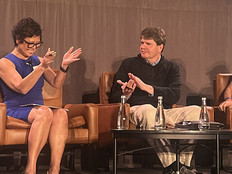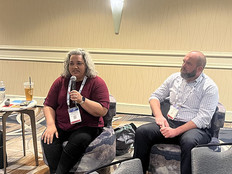ISTE 2017: Negative Moments Can Spark Creative Genius, Says Radiolab's Jad Abumrad
If there’s one lesson Jad Abumrad learned from creating his popular public radio program, Radiolab, it’s that it’s OK to be lost.
There are periods in between moments of clarity where everyone — including students — are going to feel formless and uncertain, but those are the moments where most people learn to speak in their own voice, Abumrad said during his ISTE 2017 keynote.
“How do you prepare people for that?” Abumrad asked. “I have no idea. I think it has something to do with commitment.”
Abumrad’s voice rang throughout the Henry B. Gonzalez Convention Center Sunday night, which was packed with thousands of educators and IT professionals who had filed in to hear him tell the story of RadioLab’s origins.
Abumrad is the host and creator of the popular public radio program, which is broadcast on more than 450 stations across the U.S. and has been downloaded more than 9 million times a month as a podcast.
He spoke about first trying to find his own voice when starting a radio program and emulating greats like Ira Glass and Walter Cronkite. He would sit in front of the mic and spend hours perfecting his name or intro.
Like any creative endeavor, the mic “creates a massive emptiness in the world that feels so much bigger than you,” Abumrad said. The trick is to stick with it and keep working.
“If you’re taking the process of creating seriously, the process of defining yourself seriously, there are no shortcuts,” he said. “You just have to sit there in that annoying emptiness and wait for authenticity. I have this experience every time I am in front of the mic. I’ve been doing this for 15 years. The only thing that has changed is the amount of time it takes to get through that discomfort.”
He calls that discomfort “the gut churn.” And the way to get through it is to keep creating large volumes of work, Abumrad says.
“I do believe that this is something we can teach people,” he said. “There’s a utility in that negative mindset. It acts as a thrust to push you through. It exists for a reason, I deeply believe. It’s something I wish someone had taught me.”
Check out even more ISTE 2017 coverage by heading to EdTech’s event page.








